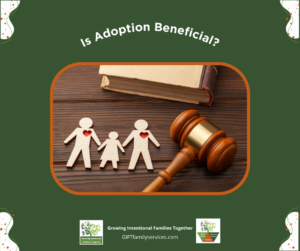 November is National Adoption Month.
November is National Adoption Month.
This month social media is filled with posts that advocate and idealize adoption. And… with increasing frequency, adult adoptees are posting their own take on adoption–one that is rooted in their personal experience. Often, these posts present a picture of adoption that reveals a more intricate picture–one that includes pain as well as gain.
So, is adoption beneficial?
How will we, how can we answer that question? Our exposure to, or involvement in, adoption, will inform our assessment so our answers will vary. Each of us processes life through the lens of our own experiences, biases, presuppositions, and knowledge base. Those of us who became parents by adopting a child, will probably tend to view adoption through a positive filter. Most adoptive parents will answer our opening question with an enthusiastic “Yes.”
Other adoptive parents might qualify their response with a more nuanced reply that takes into consideration the complexity and dualities of adoption. They might say, “Adoption is not entirely positive. Along with the gains, adoption brings significant losses and trauma.”
Birth mothers who lost a child to adoption likely view adoption through a lens colored by grief, loss, heartache, and probably some anger. Their evaluation of adoption will reflect the impact of the losses that adoption exacted–and continues to exact–from them.
While we might surmise how adoptees feel about adoption, our best guesses cannot begin to describe their experiences. We need them to use their voices and share their insights. For too long, adoptive parents and adoption professional have spoken on behalf of adoptees. They’ve told adoptees how they should feel, what they should think, and what they ought to say about adoption.
What should we do during National Adoption Month?
To gain an accurate picture, parents and professionals should ask adoptees how they feel about this NAAM observance. And then, listen to adoptees with hearts and minds fully open.
First, ask them how what support they want and need to get them through this month–throughout the year. Second, give them the floor, the stage, the megaphone. Then, listen and learn.
Thoughts on our recent conversation with Dr. Patrice Martin
We invite you to watch the lively and informative conversation that Kim, Sharon and Sally had with Dr. Martin. She asserted that while it is important to ensure that the professionals involved in finding adoptive families for foster children have training and support, it is essential that the youth and their families need to be our highest priority. They need support sooner rather than later.
Family fracture is traumatic for children. So, we need to reduce the factors that cause children to be separated from their families in the first place. Build systems that defuse the factors that lead to family breakdown before they become irretrievably broken, before adoption becomes necessary.
When adoption is appropriate, it is important that children are placed with well-informed, adoption competent parents who understand the real needs of adoptees.
What will you do this month to listen to adoptees about what it is like to live as an adoptee. How will you elevate the awareness of adoption and all of its complexity?
__________________________
-
- Call us at 1-800-653-9445
- Listen to our podcasts: Adoption Matters: Real People. Real Life. Real Talk and Essentials of Adoption Attuned Parenting
- Watch our YouTube channel
- Read Books written by our coaches
- Click to learn more about Adoption Attuned Certified coaching!
- Check out our on-demand courses.


